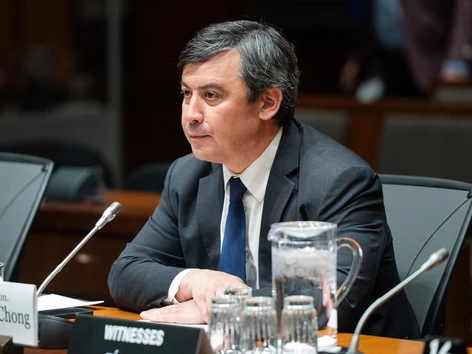In a congressional committee appearance in Washington, Canadian Member of Parliament Michael Chong discussed Canada’s response to Chinese foreign interference, highlighting concerns about the effectiveness of Ottawa’s efforts. Chong’s testimony before the Congressional-Executive Commission on China, which monitors human rights in the People’s Republic, shed light on the challenges Canada faces in addressing these issues.
Chong refrained from overtly criticizing his own government while abroad, but he acknowledged the shortcomings in Canada’s response to China’s use of transnational repression. He cited the slow response and inadequate measures as key concerns.
The Conservative foreign affairs critic shared that since the spring, the Canadian government had begun standing up for him, as he had become a target of Beijing’s diplomats, who gathered information about him and his extended family in Hong Kong. However, he did not mention that the Liberal government had failed to inform him of the Chinese targeting, despite awareness by security agencies.
Chong noted that democratic nations, including the UK, had been slow to react to the threat posed by authoritarian states like China. He mentioned the UK’s recent adoption of a foreign-agents registry and Canada’s plan to introduce a similar one. Chong’s opening statement included his personal background and experiences, highlighting his efforts to combat China’s activities in Canada, such as the actions against the Uyghurs in Xinjiang province and his role in Parliament.
He pointed out that his experiences were not unique among the 1.7 million people of Chinese descent in Canada. The tactics employed by the People’s Republic of China, such as establishing illegal police stations in the West, targeting Chinese-language media, coercing individuals on Canadian soil to return to China, and offering bounties for those on its “wanted” lists, are alarming and unacceptable in a free and sovereign country, according to Chong. He called for closer collaboration with democratic allies like the United States to counter Beijing’s interference in Canada’s democratic life.
However, the dilemma facing US policymakers is that Canada is not always considered a reliable partner in addressing these challenges. Chong suggested that allies could work more diligently to translate intelligence into evidence for judicial systems or publicly disclose intelligence to counter disinformation. He also highlighted the importance of boycotting Chinese goods produced using forced Uyghur labor, a step the United States has taken effectively.
Chong expressed the need for Canada to expedite the approval of natural resource projects to strengthen its partnership with the US. He called for regulatory reform to reduce obstacles to building natural gas pipelines and liquid natural gas export terminals.
Overall, Chong’s testimony depicted a principled individual navigating the challenges of addressing foreign interference while dealing with domestic political constraints. The hearing highlighted concerns about Canada’s response to Chinese influence efforts and its potential vulnerability due to a lack of legislative tools and a laissez-faire approach.



